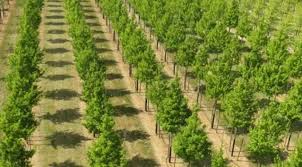News
NGO To Recruit 560,000 Youth For Mangrove Planting In Ogoni

A Non-Governmental Organisation, ‘Eco-Citizen Ogoni ‘Initiative, has launched an Eco Volunteer Portal to register 560,000 youth volunteers for the takeoff of the planting of 560million Mangrove trees in Ogoniland, Rivers State.
Launching the portal in Port Harcourt on Tuesday as part of activities to mark the International Youth Day, 2025, the Coordinator of ECOI in Ogoni, Nature Dumale, said the youths would be recruited as part of the Global Green Marshalls and would be expected to conclude the project in 2035.
Dumale stated, “The groundbreaking digital platform, the Eco-Volunteers Portal, is designed to mobilise and equip 560,000 Ogoni youth as Global Green Goal Marshalls.
“Aligned with this year’s global theme, ‘Local Youth Action for the SDGs and Beyond,’ the platform is a powerful symbol of youth-led transformation at the grassroots, showcasing how Ogoni youth are not only responding to the climate crisis, but reimagining development through community-based action, digital innovation, and regenerative impact”.
He explained that the portal represented a hub for green innovation, civic engagement, and youth-led systems transformation in Ogoniland and beyond, adding that it would activate a bold new architecture for SDG localisation, turning ecological restoration into real economic opportunity.
Dumale further said the 560,000 trained Eco-Volunteers would be deployed in 56 wards in the four local government areas of Ogoni, and that the initiative would catalyse over 500,000 green-blue economy jobs in sectors like clean energy, regenerative agriculture, aquaculture, sustainable transport, eco-enterprise, and circular economy innovation.
He noted that the portal would deliver climate-smart, community-led development aligned with SDGs 6, 7, 8, 13, 14, and 15.
According to him, “Through real-time dashboards, peer-led learning labs, fellowship placements, mission tracking, and a youth-centred opportunity marketplace, the platform positions Ogoni’s young people as designers and defenders of a just, regenerative future.
READ ALSO:Family, CSO Protest Abduction Of 12-year-old Girl In Rivers
“This portal is our response to history and our bridge to the future. It affirms the role of Ogoni youth not just as volunteers, but as visionaries. They are not waiting for opportunity to arrive, they are building it, one mangrove, one enterprise, one mission at a time.”
He said the portal also signalled a new model for planetary cooperation, rooted in the Global South, adding that with linkages to Africa-wide green youth movements and diaspora innovation networks, it would create a digital commons where local stories could scale global impact.
Dumale continued, “The Eco-Volunteers Portal comes at a critical time in Nigeria’s environmental journey, aligning with national climate adaptation goals and the broader vision for a just energy transition.
“It builds on the momentum of the Hydrocarbon Pollution Remediation Project, while charting a youth-driven pathway to sustainable peace, jobs, and justice”.
READ ALSO:Ogun Police Arrest Two Soldiers, Suspected Cultist, 19 Others During Midnight Raid
In her remarks, Senator Ireti Heebah Kingibe, Deputy Chairperson of the Senate Committee on Ecology and Climate Change, said: “We must move from remediation to regeneration — and that starts with empowering young people at the frontline.”
“This initiative represents a critical shift from extractive development to ecological stewardship. It is not just Ogoni’s future at stake — it is Nigeria’s promise to its youth and its ecosystems.”
Also speaking, Global Director of the ECO2RUPPERS Africa Initiative, Victor Wilkinson Agih, said, “This is more than a portal. It is a platform for intergenerational equity and distributed leadership.
“From the restoration of degraded ecosystems to the reinvention of livelihoods, this model shows what is possible when youth are not just included, but trusted, trained, and resourced to lead.”
The key features of the platform were listed as digital onboarding of 560,000 Eco-Volunteers; green-blue skills training and micro-credentialing; a project mission dashboard to coordinate SDG action in real time; youth-led enterprise support via funding links and circular marketplaces; and inter-ward and diaspora collaboration tools, including challenge campaigns and fellowships.
News
Court Dissolves Petitioner’s Marriage Over Lack Of Love, Care

An Area Court sitting at Centre-Igboro, Ilorin in Kwara State, on Thursday, dissolved the four-year-old marriage between Aminat Mustapha and Wahab Adeshina, following the petitioner’s insistence.
The petitioner told the court that she was no longer interested in her marriage to her husband following claims of lack of love and care.
According to the News Agency of Nigeria (NAN), while delivering ruling, the presiding judge, Mr Toyin Aluko, held that the respondent had written to the court, accepting the divorce application made by his wife.
READ ALSO:Why I Charged My Husband Money For Sex —Woman
Aluko, consequently, dissolved the marriage between the parties, and ordered the woman to observe one month iddah (waiting period) before she could remarry.
Meanwhile, the court granted custody of the two children in the marriage, ages one and three, to their mother.
He ordered the father to pay a monthly sum of N20,000 for the children’s feeding and maintenance.
The court also held that the respondent will be responsible for their education and healthcare.
Again, the court held that the father has unrestricted access to his children, but at reasonable time adding that he should be notified before any decision is taken on his children.
The judge ordered the petitioner to get a copy of the judgment and send same to the respondent.
News
Tinubu Embarks On Three-state Visit

President Bola Ahmed Tinubu will depart Abuja on Saturday on a working visit to Borno, Bauchi and Lagos.
This is contained in a statement issued by Presidential Spokesperson, Mr Bayo Onanuga, on Friday in Abuja.
While in Borno, the President will commission projects executed by the Borno State Government under Gov. Babagana Zulum, in collaboration with the Federal Government.
He will also attend the wedding ceremony of Sadeeq Sheriff, son of former Borno Governor, Sen. Ali Modu Sheriff, and his bride, Hadiza Kam Salem.
READ ALSO:Ambassadorial Nominees: Ndume Asks Tinubu To Withdraw List
From Maiduguri, Tinubu will proceed to Bauchi State to condole with the state government and the family of Sheikh Dahiru Bauchi, the renowned Islamic cleric and leader of the Tijjaniyya Muslim Brotherhood.
Sheikh Dahiru Bauchi died on Nov. 27.
After the condolence visit, the President will travel to Lagos, where he will spend the end-of-year holidays.
During his stay in Lagos, Tinubu is expected to attend several engagements, including the Eyo Festival scheduled for Dec. 27.
The festival, to be held at Tafawa Balewa Square, will honour notable personalities, including the President’s late mother, Alhaja Abibatu Mogaji, former Lagos State governors Alhaji Lateef Jakande and Chief Michael Otedola.
News
My Wife Dented My Image, Took Our Marital Crises To Radio Stations — Husband

…He ran away from home after I was delivered of twins —Wife
Grade A Customary Court sitting at Mapo, Ibadan, Oyo State, has ruled that a couple, Folaji and Ifedayo should go their different ways after it pronounced their marriage dissolved.
The court president, Mrs S.M Akintayo, who gave the judgment, stated that this was imperative to dissolve the marriage for peace to reign.
The plaintiff, Folaji, who dragged his wife to court, accused her of not loving him, always fighting him, and sometimes displaying violence.
Folaji explained that the root of their differences was Ifedayo’s bias for his mode of worship.
According to the plaintiff, he attends a white garment church, which mode of worship the defendant abhors and therefore refused to attend services with him.
Folaji also said that Ifedayo concealed from him the fact that she was suffering from a particular ailment, which he became aware of after she was advised at the hospital to carry out series of tests.
Folaji stated that the differences between him and his wife degenerated to the level that he became a regular face at the police station and also at radio stations, where his wife took their matters to.
READ ALSO:‘My Husband Kept Coffin Under Our Bed, Planned To Use Our Child For Ritual’
The plaintiff told the court that the defendant had done a lot of damage to his image, and thus prayed the court to put an end to their relationship so that he could pick up the pieces of his life.
The plaintiff sought easy access to their children and promised to give them feeding allowance weekly.
He further requested an order restraining his wife from threatening him and from interfering with his private life.
Ifedayo, in her response, agreed that their union be dissolved.
She stated that her husband was inhumane and that he packed out of their house before she was discharged from the hospital after she put to bed a set of twins.
The defendant further said that the plaintiff had never visited her and their children since he walked out of their marriage.
According to her, her husband sent her N20,000 through his counsel after he dragged her to court, but that she declined it because it was a ridiculous amount to feed a set of twins.
Folaji, in his testimony, said: “My lord, my wife, and I had a proper wedding, and I paid her bride price.
“I expected my wife to be submissive to me and do my binding, but the reverse is the case.
“My wife is stubborn and troublesome.
READ ALSO:My Husband Felt Insecure After I Got A Job, Accused Me Of Infidelity —Wife
“She swore never to attend my church because it’s a white garment church and that she loathes our way of worship.
“The more I encouraged her to attend, the more she kept her distance.
“She later reluctantly agreed to attend service once a month.
“My wife is secretive. She hid from me for years the fact that she was nursing an ailment. I only became aware of this when the doctor confirmed it after she went through a series of tests when she took ill.
“My wife, rather than being remorseful, decided to make life tough for me.
“She became troublesome and never ceased to fight me.
“She is violent and always hit and harmed me with any dangerous objects within her reach.
“We always dragged ourselves to the police station where we became a regular face.
“My wife, determined to dent my image, took our issues to radio stations where I was invited and our differences were aired.
READ ALSO:My Husband Felt Insecure After I Got A Job, Accused Me Of Infidelity —Wife
“I walked out of our marriage when I could no longer tolerate my wife’s misbehaviour.
“She reported me again at the welfare office and, after mediating in our differences, I was asked to provide her with foodstuff and not money, which I did on a regular basis.
“But she has insisted that I would not have rest of mind.
“I pray this court to dissolve our marriage and grant me free access to our children. I promise to make provision for their upkeep on a weekly basis.
“I further request an order restraining my wife from threatening and interfering with my private life.”
Ifedayo, in her response, said: “I agree that our marriage be dissolved. My husband is inhumane and has no conscience, which were the causes of the crisis we experienced in our marriage.
“I was admitted in the hospital to be delivered of our set of twins, but I returned to meet an empty house. My husband deserted me and our newborn children.
READ ALSO:My Husband Shows His Other Wives More Affection, Woman Tells Court
“He never checked on them nor gave anything for their upkeep. He only gave them N20,000 of recent through his counsel after he came to court.
“I rejected the money because such an amount can not feed sufficiently two children of their age, not to mention other needs.
“I plead that the court grant me custody of our children and make my husband responsible for their upkeep.
“I want him to give attention to their feeding and pay their school fees as and when due.
“He should likewise be available any time they need medical attention.”
Giving her judgment, Mrs Akintayo said although both had a valid customary marriage and bride price was paid, the court had no choice than to grant their prayers of divorce since they now express their disinterest in it.
Akintayo ruled that they were no longer husband and wife.
She granted custody of their children to the defendant, stating that they were still minors in need of motherly care.
The defendant was granted access to their children on a weekly basis while he was ordered to be responsible for their welfare.

 News4 days ago
News4 days agoWage Dispute: Court Orders PSG To Pay Mbappe €61 Million

 Headline4 days ago
Headline4 days agoAircraft Crashes In Owerri With Four Persons Onboard

 Sports4 days ago
Sports4 days agoJUST IN: Dembélé Named FIFA Best Men’s Player, Bonmatí Wins Women’s Award

 Metro3 days ago
Metro3 days agoAlleged Organ Harvesting: Bereaved Families Rush To Check Corpses

 Business4 days ago
Business4 days ago9th FirstBank Digital Xperience Centre Launched In UNIBEN

 Business4 days ago
Business4 days agoCBN Revokes Licences Of Aso Savings, Union Homes As NDIC Begins Deposit Payments

 News4 days ago
News4 days agoOkpebholo Presents ₦939.85bn ‘Budget Of Hope, Growth’ To Edo Assembly

 News4 days ago
News4 days agoTrump Places Nigeria, 14 Others On Partial Travel Restrictions To US

 News3 days ago
News3 days agoForest Reserve: Okpebholo Broker Peace Between Host Communities, Investors

 News4 days ago
News4 days agoOPINION: Man-of-the-people, Man-of-himself






























